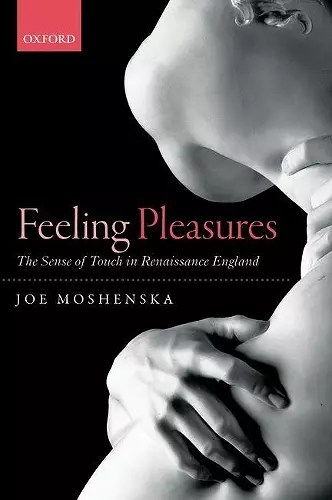Feeling Pleasures
The Sense of Touch in Renaissance England
Format:Paperback
Publisher:Oxford University Press
Published:14th Sep '17
Currently unavailable, and unfortunately no date known when it will be back
This paperback is available in another edition too:
- Hardback£117.50(9780198712947)

The sense of touch had a deeply uncertain status in the sixteenth and seventeenth centuries. It had long been seen as the most certain and reliable of the senses, and also as biologically necessary: each of the other senses could be relinquished, but to lose touch was to lose life itself. Alternatively, touch was seen as dangerously bodily, and too fully involved in sensual and sexual pleasures, to be of true worth. Feeling Pleasures argues that this tension came to the fore during the English Renaissance, and allowed some of the central debates of this period--surrounding the nature of human experience, of the material world, and of the relationship between the human and the divine--to proceed through discussions of touch. It also argues that the unstable status of touch was of particular import to the poetry of this period. By bringing touch to the fore in a period usually associated with the dominance of vision and optics, Joe Moshenska offers reconsiderations of major English poets, especially Edmund Spenser and John Milton, while exploring a range of spheres in which touch assumed new significance. These include theological debates surrounding relics and the Eucharist in the work of Erasmus, Thomas Cranmer and Lancelot Andrewes; the philosophical history of tickling; the touching of paintings and sculptures in a European context; faith healing and experimental science; and the early reception of Chinese medicine in England.
Moshenska, in this careful, authoritative, yet often amusing and entertaining study, sets out to offer an alternative account, where tactility retains perhaps not its primacy in the hierarchy of the senses. * Eric Langley, The Seventeenth Century. *
Feeling Pleasures develops subtle accounts of the ambivalent status of touch in specific literary texts (especially The Faerie Queene and Paradise Lost) and also makes a brilliant argument for touch as a major contributor to theories of perceiving, knowing, and social organization, not only in natural and political philosophy (Bacon, Galileo Galilei, René Descartes, Hobbes, Margaret Cavendish, Robert Boyle, and more) but also in the visual arts and medicine [some of the] best work of the year. * Katherine Eggert, Recent Studies in the English Renaissance *
Joe Moshenska's extraordinary book Feeling Pleasures is a richly textured gathering together of canonical literature, philospophy and science, alongside the seriously strange ... It is a terrific accomplishment. * Katherine Craik, The Times Literary Supplement *
A compelling new approach for sensory studies, one that grapples with tactility as an experimental interface with the world. * Holly Dugan,The Spenser Review *
Moshenska delivers an extremely readable and satisfying piece of historically informed literary criticism, which should deservedly take its place in a well-established critical field ... His contribution is, at heart, a study of the period vocabulary of touch, vulnerability and sensitivity and, as such, involves itself deeply in the language and metaphor of each evocatively treated text. Feeling Pleasures is often touching, consistently sensitive and genuinely pleasurable. * Eric Langley, The Seventeenth Century *
[A]n impressive scholarly achievement. This thoughtfully observed and beautifully written book is a pleasure to read, and a moving reminder that the instinct toward intimate contact lies at the heart of all of our inquiries into the lost worlds of the past. * Tanya Pollard, Renaissance Quarterly *
ISBN: 9780198807193
Dimensions: 234mm x 156mm x 23mm
Weight: 618g
402 pages